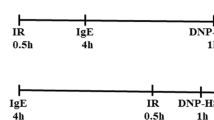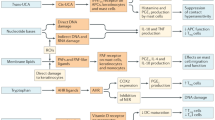Abstract
IN recent work1 it was found that cells obtained by washing out the rat's peritoneal cavity with saline could be rendered photosensitive. Exposure to light for a period too brief to affect leucocytes and serosal cells caused the granules of sensitized mast cells to lose their basophilic staining properties, after which they became refractory to the action of the histamine-releaser, compound 48/80. Mast cells reacted in this way even after being separated from the other cells by differential centrifugation.
This is a preview of subscription content, access via your institution
Access options
Subscribe to this journal
Receive 51 print issues and online access
$199.00 per year
only $3.90 per issue
Buy this article
- Purchase on Springer Link
- Instant access to full article PDF
Prices may be subject to local taxes which are calculated during checkout
Similar content being viewed by others
References
McGovern, V. J., A.M.A. Arch. Derm., 83, 94 (1961).
Archer, G. T., Nature, 182, 726 (1958).
Lowry, O. H., Graham, H. T., Harris, I. B., Priebat, M. K., Marks, A. R., and Bregman, R. V., J. Pharm. Exp. Ther., 112, 116 (1954).
Author information
Authors and Affiliations
Rights and permissions
About this article
Cite this article
McGOVERN, V. Mast Cells in Photosensitivity Reactions. Nature 191, 90–91 (1961). https://doi.org/10.1038/191090b0
Issue Date:
DOI: https://doi.org/10.1038/191090b0
Comments
By submitting a comment you agree to abide by our Terms and Community Guidelines. If you find something abusive or that does not comply with our terms or guidelines please flag it as inappropriate.



